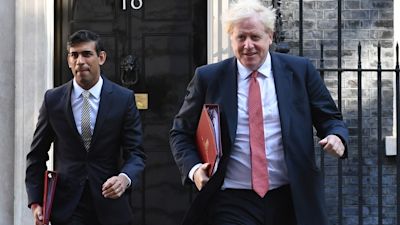Insight
Peston: Boris Johnson and Rishi Sunak choose spending over tax cuts

Here is my Sunak budget in a nutshell (or maybe a slightly larger coconut shell).
As I mentioned this morning, it is all about the Office of Budget Responsibility's significant upward revision of economic growth to 6.5% this year and 6% next.
The point is that this growth plus higher than expected inflation - of 4% over the coming year - increased receipts for the government (mainly tax revenues) "by around £50bn a year".
So the big political choice for Rishi Sunak, and his boss Boris Johnson, was what to do with this revenue windfall - which is circa £35bn a year after expected increases in welfare and debt-interest spending.
Watch the Budget and discussion from the House of Commons
As you will recall, Sunak increased taxes by a very un-Conservative £40bn a year in the March budget and in the emergency medicine for the NHS and social care in September.
The burden of income tax, national insurance and corporate tax all increased very significantly, taking the overall tax burden to a record high.
What is very striking - and has been the big political choice of Sunak and Johnson - is that the budget did nothing to reverse this rising tax burden.
Instead a decision was taken to increase day to day spending on public services by around £40bn a year, with well over a third of the overall increase going to health alone.
So whatever Johnson and Sunak may say, they are not ideologically motivated low tax Tories.
They are investing in public services partly because they believe that reflects the priorities of most British people - and partly because the Labour opposition is thereby marginalised.un
The one other striking choice they made was to in effect increase benefit payments for the lowest paid, by reducing the rate at which Universal Credit is cut for every additional pound earned by a worker from 63% to 55%.
This is the equivalent of an eight pence in the pound tax cut for the lowest paid, and will cost £2.5bn a year in 2024.
You will have noticed that towards the end of his speech Sunak riffed on the importance of individual responsibility and that the state can't fix everything for families.
And he promised that if resources allow, he'll cut taxes at the end of the parliament.
But this budget is expansionary to the tune of £25bn next year, most of it down to public spending. That will NOT deter the Bank of England raising interest rates on Thursday.
Right now, this is a very red Tory government.